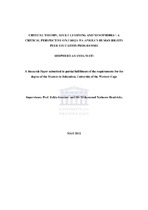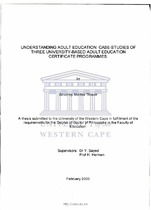Critical theory, adult learning and‘xenophobia’: a critical perspective on umoja wa Afrika’s human rights peer education programme
Abstract
The impact of global migration on local contexts has spawned new issues and a range of social responses. These include the emergence of ‘xenophobia’ in the terrain of discrimination and the subsequent development of popular educational responses to this. As part of popular educational responses, adult education programmes have assumed an important role in changing people’s attitudes.
This long research paper presents a critical analysis of how a human rights and
counter-xenophobia peer educators’ programme enables young adults to develop a
critical consciousness about human rights and ‘xenophobia’. The research focused on learning materials, course content, training methodology and processes of a three-day human rights and counter-xenophobia workshop held by Umoja wa Afrika, a local non-governmental organization, in March/April 2007 at Goedgedacht, just outside Cape Town. The research was based on qualitative methodology which included an exploration of relevant literature, interviews with participants and facilitators, as well as the researcher’s critical reflections.The research was located within a critical theory framework in the field of adult learning, and drew from the work of Paulo Freire (1970) and Stephen Brookfield(2005).The key finding of the study is that the experience of the workshop enabled participants to develop a critical awareness - but not necessarily a critical understanding of human rights and ‘xenophobia’. The participants identified specific factors that contributed to such awareness. These included the diverse composition of participants, the ‘accompanying’ facilitation style, and the interactive training methodology.This study makes a contribution to understanding human rights peer education in the
South African context and the extent to which such provision could enable participants to develop a critical understanding of human rights and xenophobia. This study is an attempt to make an original contribution in this area. As such it adds to literature in applied critical methodology.
Collections
Related items
Showing items related by title, author, creator and subject.
-
The challenges facing adult educators in reducing illiteracy among adults above twenty years of age: an Eastern Cape case study
Ndlovu, Mpumelelo (University of the Western Cape, 2008)This study analyses the challenges faced by adult educators in reducing illiteracy among adult above twenty years of age in the Eastern Cape. The focal point is on ascertaining why there is an increase in the percentage ... -
Assessment practices of adult educators in Mamelodi Adult Learning Centers
Mongalo, Lucky (University of the Western Cape, 2008)This study explores the assessment practices of adult educators in Mamelodi Adult Learning Centers using a qualitative methodology. The study recognizes that assessment is an important activity within the education and ... -
Understanding adult education: Case-studies of three university-based adult education certificate programs.
Thaver, Beverley Martha (University of the Western Cape, 2000)By the mid-1980s, the Nationalist Party had sought to salvage almost four decades of apartheid policies that were based on white supremacy. In this regard, it engaged in dual strategies of repression and reform. The ...




